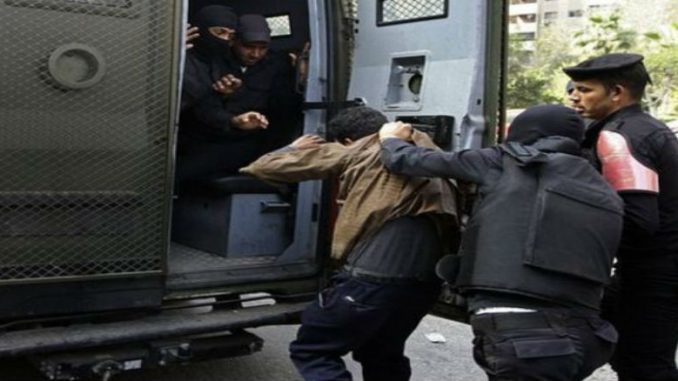
The Egyptian military regime is using a law that was repealed 89 years ago to prosecute Irish citizen Ibrahim Halawa and 493 others on charges that could lead to the penalty, according to a human rights NGO.
The Cairo Institute for Human Rights Information (CIHRS) filed a lawsuit with the Administrative Court to halt the implementation of a “century-old Assembly Law “that it found out has been repealed 89 years ago by Egypt’s parliament, according to a press statement released by the rights group .
In addition, a report titled “Toward the Emancipation of Egypt” was published by CIHRS that gives details on the historical, legal and political context within which the Assembly Law was issued.
In fact, Law 10/ 1914, known as the Assembly Law, dates back to the British colonial era.
CIHRS said that the law continues to be used by the Egyptian courts in their rulings along with the controversial protest law passed in Nov. 2013, leading to the imprisonment of thousands of “peaceful Egyptian demonstrators.”
In this context, CIHRS filed a lawsuit that seeks the “official promulgation” of the law that repealed the Assembly Law nearly a century ago, thereby effectively repudiating the Assembly law and obliging the courts not to implement it.
CIHRS Director Bahey eldin Hassan said, “It’s time Abdel Fattah al-Sisi takes the initiative to immediately renounce this historic and legal indignity by abolishing the British colonial administration law, originally designed to suppress Egyptian resistance to occupation.”
Moreover,Egypt’s program manager at CIHRS Mohamed Zaree, stated that the post-colonial national governments depended on the Assembly Law “as a reference for supplementary repressive legislation and codified even the use of lethal force against peaceful demonstrators”, pointing to the protest law and an interior ministry decree regarding the use of force by the police.
CIHRS Director said that the NGO challenged the legitimacy of the Assembly Law before the court as its continued “illegal implementation” hinders justice.
In the same context, Legal researcher at CIHRS Mohamed al-Ansary mentioned that the Assembly Law “saves courts the trouble of finding a basis for criminal liability for every citizen, which is a core part of their work in realizing justice.”
According to al-Ansary,”Crowding” is used as a charge to indict every citizen who participated in the assembly or called for it, resulting in mass sentences issued by courts “indiscriminately” against all demonstrators.
In fact, Cairo Institute report was supported by Reprieve (a British human rights) organization which said in a statement,“Egypt’s 1914 Assembly Law has been cited by the authorities as a key part of the legal basis for the ongoing trial of 494 people, who face the death penalty on charges relating to protests.”
Moreover, Reprieve shed light on Ibrahim Halawa‘a case with others as they have been subjected to illegal implementation of that law.
The statement said, “They include Ibrahim Halawa, from Dublin, who was a juvenile at the time of his arrest, adding that “Ibrahim and his co-defendants have reported being regularly tortured in pre-trial detention.”
In addition,Harriet McCulloch,the deputy director of Reprieve death penalty team said “This report sheds new light on some of the most appalling abuses of Egypt’s justice system.”
She said,“In Ibrahim’s case, the authorities are detaining 494 people, regularly torturing them, and threatening them with the death penalty – all on the basis of a protest law that shouldn’t even be on the statute books anymore.”
Ibrahim Halawa was 17 years old when he was arrested in August in the wake of the protests that erupted against the military coup in 2013.Despite being a juvenile at the time of his arrest,he has been facing a potential death sentence.
Last September, The Guardian published a new letter sent by Ibrahim Halawa who unveiled that he has suffered beatings and racist abuse from prison guards, as reported by Reprieve, a human rights organization.
He added that he misses everything about Ireland and he is “sad about not seeing my dad, who is old and ill and my beautiful kind sisters. ”
In his letter, Ibrahim writes desperately that the mass trial “has not moved one step forward” since his arrest, adding that in hearings “I can’t speak to the judge; he can’t ask me any questions. I can’t speak to my lawyer; my lawyer can’t speak to me. My family are constantly refused entry to the court.”
Maya Foa, director of the death penalty team at Reprieve human rights organization,which is assisting Ibrahim said,“It’s chilling to hear of the appalling abuses Ibrahim and other prisoners are suffering daily, while they await a mass trial which could see them sentenced to death next month. Ibrahim was a juvenile when he was arrested, and he has been through a horrifying, illegal ordeal which must end now. His heartbreaking words about how much he misses his family and his home country must not fall on deaf ears – Egypt must release him without delay, along with the hundreds of prisoners who were rounded up with him.”
It is worth to mention that since the military coup in 2013 led by former Minister of Defense Abdel Fattah la-Sisi, the Egyptian authorities have launched massive crackdown on political opposition,rights group and journalists.
In this context, the Egyptian authorities have also adopted, the protest law which came under heavy scrutiny from local and international rights groups, that has detained and convicted thousands of people on protest charges.
As a result,right lawyers filed lawsuits in September 2014, appealing articles 8 and 10 of the protest law, and suggested several amendments to the law in its current format.
The Supreme Constitutional Court (SCC) said in December that article 10 of the protest law was unconstitutional. Article 10 tackles the authority of interior ministry in blocking protests. In addition, the court also decided to cancel the second part of the same article.



